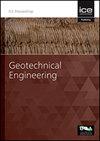用纳米二氧化硅和纳米氧化铝稳定泥灰岩问题土样品的阻力和膨胀性
IF 2
4区 工程技术
Q3 ENGINEERING, GEOLOGICAL
Proceedings of the Institution of Civil Engineers-Geotechnical Engineering
Pub Date : 2022-01-31
DOI:10.1680/jgeen.21.00016
引用次数: 4
摘要
本研究调查了纳米二氧化硅和纳米氧化铝对伊朗大不里士灰泥土的影响。这些土壤属于可膨胀土壤,构成了大不里士大多数项目的基础。由于吸水,这些土壤在工程基础中容易发生体积变化和失稳风险。因此,人们采用了各种物理和化学方法来稳定这些土壤。在本研究中,首次使用不同百分比的纳米二氧化硅和纳米氧化铝来稳定大不里士泥的重建样品,与普通添加剂(如波特兰水泥或石灰)相比,纳米二氧化硅和纳米氧化铝对环境的影响更小。此外,通过各种实验,包括阿特伯格极限、密度、自由膨胀、膨胀压力、加州承载比(CBR)试验、直接剪切试验、场发射扫描电镜(FESEM)和x射线粉末衍射(XRD)分析,对土的膨胀行为进行了评估,这些实验分别在固化1、7和28天进行。结果表明,纳米氧化铝比纳米二氧化硅对稳定样品的溶胀有更大的抑制作用。然而,纳米二氧化硅在提高CBR强度方面的作用大于纳米氧化铝。本文章由计算机程序翻译,如有差异,请以英文原文为准。
Resistance and Swellability of Stabilized Samples of Marl Problematic Soils Using Nano-silica and Nano-alumina
This study investigates the effects of Nano-silica and Nano-alumina on the Marl soil as a problematic soil in Tabriz, Iran. These soils, which are among the swellable soils, constitute the foundation of most projects in Tabriz. Due to water absorption, these soils are liable to volume change and instability risks in the foundation of projects. Consequently, various physical and chemical methods have been employed to stabilize these soils. In the present study, for the first time, the reconstructed samples of Tabriz Marl were stabilized with various percentages of Nano-silica and Nano-alumina, which have fewer environmental effects in comparison with ordinary additives such as Portland cement or lime. In addition, soil swelling behaviors have been evaluated by various experiments including Atterberg limits, density, free swelling, swelling pressure, California Bearing Ratio (CBR) tests, direct shear tests, Field Emission Scanning Electron Microscopy (FESEM), and X-ray powder diffraction (XRD) analyses which were conducted at 1, 7, and 28 days of curing times. The results show that Nano-alumina has a greater effect on reducing the swelling of stabilized samples than Nano-silica. However, the effect of Nano-silica has been more than Nano-alumina on increasing the strength CBR.
求助全文
通过发布文献求助,成功后即可免费获取论文全文。
去求助
来源期刊
CiteScore
4.40
自引率
4.50%
发文量
68
审稿时长
3 months
期刊介绍:
Geotechnical Engineering provides a forum for the publication of high quality, topical and relevant technical papers covering all aspects of geotechnical research, design, construction and performance. The journal aims to be of interest to those civil, structural or geotechnical engineering practitioners wishing to develop a greater understanding of the influence of geotechnics on the built environment.

 求助内容:
求助内容: 应助结果提醒方式:
应助结果提醒方式:


